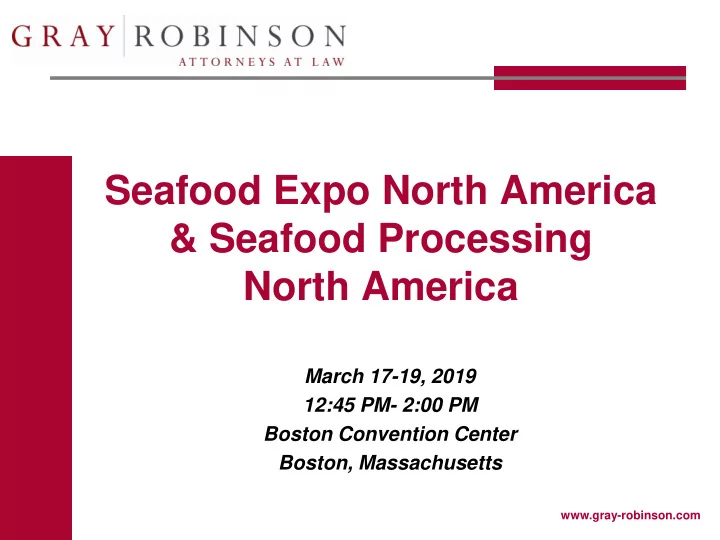

Seafood Expo North America & Seafood Processing North America March 17-19, 2019 12:45 PM- 2:00 PM Boston Convention Center Boston, Massachusetts www.gray-robinson.com
Peter Quinter, Attorney Customs & International Trade Law Group GrayRobinson, P.A. Mobile (954) 270-1864 Office (305) 416-6960 Peter.Quinter@Gray-Robinson.com Skype: Peter.Quinter1 www.gray-robinson.com
Recognized as one of the “Best Lawyers in America” in the area of FDA law : 2009 to 2019 www.gray-robinson.com 3
Do you have questions about importing/exporting? www.GRCustomsLaw.com www.gray-robinson.com 4
Learning Objective • Avoiding common and costly errors for seafood importation and distribution. • Compliance with U.S. Government regulations and procedures to avoid detentions, delays, seizures, penalties, and criminal prosecution. www.gray-robinson.com 5
QUESTIONS?? www.gray-robinson.com 6
Selection of Entry to Refusal by FDA Arrival Examination CBP and for Misbranding by FDA FDA or Adulteration Proof of Destruction Under FDA Supervision on CBP Demand CBP Form 7512 or Proof of Exportation under for Redelivery CBP Supervision on CBP Form 3499 Liquidated Damages Claim by CBP for 3 Petition Times the Value of Shipment Up to the Mitigation Maximum Amount of the Import Bond www.gray-robinson.com 7
CBP Form 301 Customs Bond www.gray-robinson.com 8
Seafood Fraud 1. Seafood Substitution Substituting an inexpensive species for one of higher value can be relatively easy. The differences in the taste and texture of different fish species’ flesh may be subtle, and therefore it is frequently difficult to identify a species in fillet form, especially after it is prepared for consumption. 2. Seafood Short-Weighting – overglazing, soaking, and breading 3. Mislabeling Country of Origin (transshipments) www.gray-robinson.com 9
Transshipment and Mislabeling to Avoid Customs Duties Transshipment occurs when foreign producers ship goods through a second country en route to the United States. Transshipment is illegal if done for the purpose of circumventing duties and other applicable trade restrictions. EXAMPLES 1. Shrimp from China to the United States by way of Cambodia and Malaysia to avoid paying antidumping duties levied by the United States on shrimp imported from China. 2. Vietnamese catfish has been mislabeled as sole specifically to avoid paying antidumping duties. www.gray-robinson.com 10
Adulterated • A food shall be deemed to be adulterated: (1) if it bears or contains any poisonous or deleterious substance which may render it • Injurious to health; but in case the substance is not an added substance such food shall not be considered adulterated under this clause if it the quantity of such substance in such food does not ordinarily render it injurious to health; or (2) If it bears or contains any added poisonous or added deleterious substance (3) if it consists in whole or in part of any filthy, putrid, or decomposed substance www.gray-robinson.com 11
Misbranded • A food shall be deemed misbranded if: – (1) its labeling is false or misleading in any particular way; or – (2) its advertising is false or misleading in a material respect • If it is offered for sale under the name of another food • If it is an imitation of another food, unless its label bears, in type of uniform size and prominence, the word “imitation” and, immediately thereafter, the name of the food imitated • If its container is so made, formed or filled as to be misleading. www.gray-robinson.com 12
Detention without Physical Examination (DWPE) DWPE is appropriate when there exists a – history of the importation of violative products , – or products that may appear violative , – or when other information indicates that future entries may appear violative Detention without physical examination properly places the responsibility for ensuring compliance with the law on the importer. www.gray-robinson.com 13
Notice of FDA Action • Products that appear (from examination or otherwise) to be violative may be detained and ultimately refused entry into the U.S. www.gray-robinson.com 14
Refusal • The product then has to be exported or destroyed (in accordance with CBP Bulletin) within 90 days otherwise subject to Liquidated Damages. www.gray-robinson.com 15
www.gray-robinson.com 16
Notice of Penalty or Liquidated Damages www.gray-robinson.com 17
Removal from Import Alert List • FDA’s Regulatory Procedures Manual provides guidance to those who wish to get off the Import Alert list: • Generally, one would need: – A minimum of five consecutive non-violative commercial shipments must enter the U.S., – At least one of the five non-violative entries should be audited by the FDA to ensure compliance, – The five shipments must be over a reasonable time period , not one day – A Petition must be filed with the FDA requesting that the importer be removed from the automatic detention list www.gray-robinson.com 18
www.gray-robinson.com 19
www.gray-robinson.com 20
www.gray-robinson.com 21
Peter Quinter, Attorney Customs & International Trade Law Group GrayRobinson, P.A. Mobile (954) 270-1864 Office (305) 416-6960 Peter.Quinter@Gray-Robinson.com Skype: Peter.Quinter1 www.gray-robinson.com
Seafood Expo North America & Seafood Processing North America March 17-19, 2019 12:45 PM- 2:00 PM Boston Convention Center Boston, Massachusetts www.gray-robinson.com
Recommend
More recommend